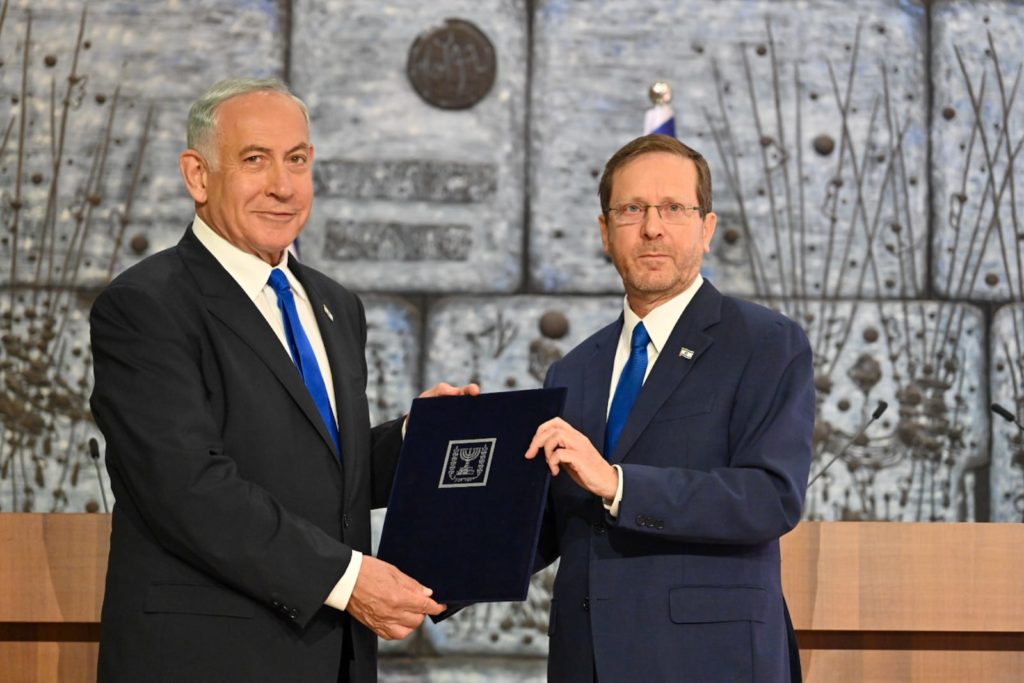
Israeli Prime Minister-elect Benjamin Netanyahu has a plan for Israel-Palestinian peace—and it is fueled by peace with Saudi Arabia. In a wide-ranging interview with Al Arabiya published on Thursday, Netanyahu took the approach of the Trump peace plan and the Abraham Accords in arguing that peace with Israel’s Arab neighbors can ultimately drive an Israel-Palestinian peace deal. In particular, he said that normalization between Israel and the Saudis would act as what he repeatedly called a “quantum leap” towards broader Israel-Arab peace, including resolution of the Palestinian conflict.
This view comes as Israel continues to reap the benefits of the Abraham Accords peace deals with the United Arab Emirates (UAE), Bahrain, Morocco and Sudan. In the interview, the transcript of which was posted to Al Arabiya’s website, Netanyahu said he plans to “pursue” peace with the Saudis, who heretofore have insisted that the Israeli-Palestinian conflict be resolved first.
Netanyahu, in contrast to the Palestinian-first approach, believes that a Saudi-Israeli peace would be impactful by helping convince the Palestinians that Israel is “here to stay” and remove a longstanding roadblock to Israel-Palestinian peace: The ongoing belief that Israel can be driven out of its homeland.
The prospects of Israel-Saudi peace are unclear at best at this stage. However, there are signs of progress. Recently United States Secretary of State Antony Blinken, in a speech published by the State Department, highlighted the incremental diplomatic step forward by the Saudis to permit Israeli civilian planes to use Saudi air space that included President Joe Biden’s historic flight from Israel to Saudi Arabia. Blinken included that in the broader context of regional diplomacy he characterized as “efforts to integrate Israel,” efforts presumably being made by the US.
In Netanyahu’s interview with Al Arabiya, he said he believes that peace with the Palestinians involves them having “all the powers to govern themselves”, but unable to threaten the existence of Israel. This, the long-time Israeli leader said, would require “creative” approaches to solve issues between the sides.
Despite the long-standing diplomatic malaise between Israel and the Palestinians, Netanyahu believes that the Palestinians will accept Israel’s existence as others—especially the Saudis—demonstrate that acceptance themselves. Once they believe Israel is never going away, then the Palestinians will be convinced to make peace with the Jewish state.
In the meantime, more progress towards peace between Israel and their Arab neighbors is being made—in the world of Esports. The “Esports Peace Games” digital video game championship, according to a joint press release from Israel and the United States, is to be held in Tel Aviv in January.
The tournament will include competitors from not only Israel and the United States, but also Middle East countries such as Morocco, the United Arab Emirates, Bahrain, and other unnamed nations. The event has a prize fund of $82,000 for winners.
US Ambassador to Israel and Co-Chair of the Games Thomas Nides was quoted in the press release as saying, “The Abraham Accords are critical to the region’s stability and prosperity. The Biden Administration sees its job as taking the Accords from a start up to a real operation. And one of the most important mechanisms to accomplish that is building people-to-people connections—the more people understand one another, the easier it is to resolve issues.”
Nides noted that connections among young people are especially important and the Esports tournament is one of “many joint cultural activities being organized around the Accords, connecting with the region’s youth to make sure the Accords are substantiable.”
Emmanuel Nahshon, Deputy Director General for Public Diplomacy of Foreign Affairs, posted on Twitter that Israel’s Foreign Ministry is “proud to be part of this unique Abraham Accords e-gaming peace tournament and to contribute to its success! This is a wonderful way to bring the message of peace to young people all over.”
In the press release, philanthropist Sylvan Adams, co-chair of the Games, called the Abraham Accords a “game changer for our region” with a range of benefits. “But for this to endure, to weave the warm peace that we all seek in the region, we must have people to people exchanges-sporting, cultural and especially, tourism with our neighbors,” said Adams.
While the Abraham Accords have made these international connections official, video games were already a link between Israelis and Arabs—and now they can help deepen the broader ties. Ido Brosh, President, Israeli Esports Association, said in the press release, “Israeli gamers have long enjoyed playing online with all peoples, fellow gamers, from all over the world, including the Middle East. To be able to welcome them to Israel is a true honor and a sign of how we share so much more than divides us.”
(By Joshua Spurlock, www.themideastupdate.com, December 15, 2022)
